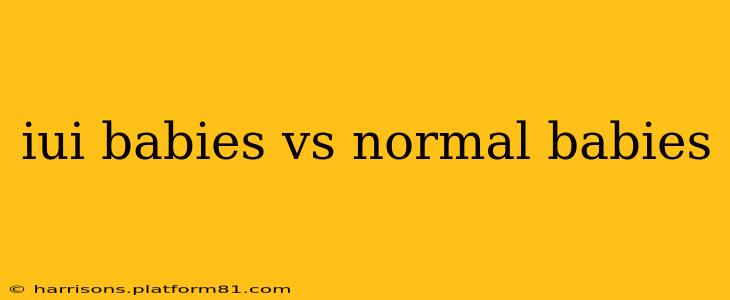IUI Babies vs. Naturally Conceived Babies: Are There Differences?
Many couples embarking on their journey to parenthood explore various assisted reproductive technologies (ARTs), with intrauterine insemination (IUI) being a common choice. This leads to a natural question: are there any significant differences between babies conceived through IUI and those conceived naturally? The short answer is: generally, no. However, there are some nuances worth exploring.
This article will delve into the common questions surrounding IUI babies compared to naturally conceived babies, addressing potential misconceptions and offering evidence-based insights. We will explore factors like developmental milestones, health outcomes, and potential long-term effects.
What are the differences in development between IUI and naturally conceived babies?
Extensive research consistently shows that IUI babies develop similarly to naturally conceived babies. There is no substantial evidence to suggest differences in developmental milestones, such as crawling, walking, talking, or cognitive development. The process of fertilization and subsequent fetal development remains fundamentally the same, regardless of whether conception occurred naturally or through IUI. Any observed differences are usually within the normal range of variation seen in all babies.
Are there any health differences between IUI and naturally conceived babies?
Studies have not identified significant differences in the overall health of IUI babies compared to naturally conceived babies. Both groups may experience similar rates of common childhood illnesses and developmental issues. However, it's crucial to remember that the health of a baby is influenced by many factors, including genetics, prenatal care, and postnatal environment, not just the method of conception. Regular check-ups and prenatal care are essential for both IUI and naturally conceived pregnancies.
Do IUI babies have a higher risk of birth defects?
The overwhelming scientific consensus is that IUI does not increase the risk of birth defects. The slight increase in multiple pregnancies sometimes seen with IUI (due to the potential for multiple eggs being fertilized) is a risk factor associated with premature birth and low birth weight, which can increase the risk of certain complications. However, this is more closely linked to the multiple pregnancy itself than to the IUI procedure. Well-managed IUI procedures minimize the risk of multiple pregnancies.
Are there any long-term health effects for IUI babies?
Current research does not support the existence of any long-term health effects specific to babies conceived through IUI. Again, factors such as genetics and environmental influences play a far greater role in long-term health outcomes. There's no scientific evidence indicating that children conceived through IUI are at increased risk for chronic illnesses or developmental problems later in life.
Is there a difference in personality or temperament between IUI babies and naturally conceived babies?
There's no scientific basis to suggest any differences in personality or temperament between babies conceived through IUI and those conceived naturally. Personality and temperament are complex traits shaped by genetics, environment, and individual experiences throughout life.
What are the psychological differences, if any, between parents of IUI babies and those of naturally conceived babies?
The emotional journey to parenthood can vary greatly for all couples. While some parents may experience increased stress and anxiety during the IUI process, the overall psychological well-being of parents of IUI babies is not inherently different from that of parents of naturally conceived babies. Support systems and open communication play a significant role in navigating the emotional aspects of parenthood, regardless of the method of conception.
In conclusion, while the journey to conception may differ, current evidence indicates that babies conceived through IUI are remarkably similar to those conceived naturally in terms of development, health, and long-term outcomes. The focus should remain on providing optimal prenatal care and a supportive environment for all children, regardless of their conception story. If you have specific concerns, consulting with your healthcare provider or a fertility specialist is always recommended.
